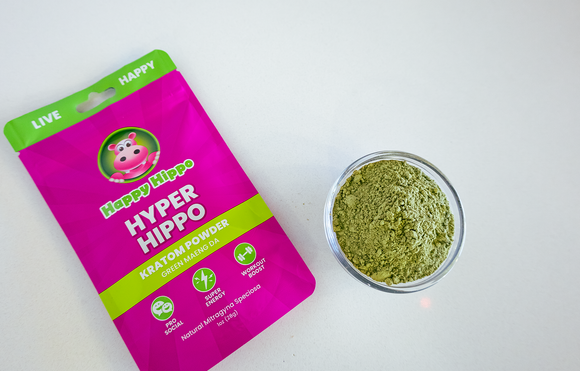When it comes to botanicals, quality is everything. Reputable vendors source Kratom from trusted farmers, and they go the extra mile by testing for microbes and contaminants before the product ever reaches you.
Some companies, like Happy Hippo, even sterilize their Kratom to eliminate lingering bacteria; a standard practice for food-grade products. This attention to safety ensures that you're consuming a clean, effective, and reliable product.
To be sure you're getting the best, always choose GMP-certified vendors.
What Is GMP and Why Is It Important?
Good Manufacturing Practices (GMP) are a set of safety and quality regulations enforced by the FDA for industries it oversees. Since Kratom isn’t currently regulated by the FDA, responsible vendors voluntarily adopt GMP standards to ensure product safety and consistency.
Companies like Happy Hippo have earned GMP certification through the American Kratom Association (AKA), a distinction that proves commitment to high standards.
Common Kratom Effects: What to Expect
People take Kratom for many different reasons. Here are some commonly reported benefits:
-
Increased energy (especially with smaller servings)
-
A sense of calm and well-being
-
Temporary relief from physical discomfort
-
Improved mood or motivation
-
Support for relaxation with larger servings
In countries like Thailand, Kratom has traditionally been used by laborers to stay energized throughout the day, similar to how we use coffee here.
How Long Does Kratom Stay in Your System?
The duration of Kratom's effects and its presence in your system can vary based on several factors, including the strain, serving size, and your body’s metabolism.
Scientific studies have reported a wide range of half-lives for Kratom, from as short as 2 hours to as long as 24 hours. These variations are due in part to the different alkaloid profiles found in Kratom products.
Long-Term Kratom Use: What Do We Know?
Research on Kratom’s long-term effects is still developing. While some studies have analyzed long-term users, no conclusive evidence has shown significant cognitive impairment. For example, one study of regular Kratom users found no clear impact on memory, attention, or motor function.
That said, more research is needed, and as always, if you’re planning to use Kratom long-term, it’s smart to talk with your doctor first.
Can You Build a Tolerance to Kratom?
Yes! Just like with caffeine, frequent Kratom use can lead to tolerance. That means over time, you might need more to feel the same effects.
To avoid this, consider rotating strains or taking periodic breaks. For more tips, check out our guide on Managing Kratom Tolerance.
Is Kratom Safe During Pregnancy or Breastfeeding?
It’s strongly recommended that pregnant or breastfeeding women avoid Kratom. There’s little research on how Kratom affects unborn or nursing babies, and using Kratom during pregnancy may carry legal risks in states where the plant is banned.
Always consult a medical professional before taking any herbal product while pregnant or nursing.
Can Seniors Use Kratom?
For many older adults, Kratom may offer benefits like increased comfort or energy. But as with any supplement, it's essential to consult a doctor, especially if you have pre-existing health conditions or take medications.
In countries like Thailand, many elderly individuals have used Kratom for generations. But here in the U.S., professional guidance ensures safe and appropriate use.
Will Kratom Show Up on a Drug Test?
Kratom doesn’t typically show up on standard drug tests. However, some specialized tests can detect Kratom’s alkaloids, especially if the testing panel is designed to screen for it.
If you're subject to drug screenings, it’s wise to be cautious and ask about the scope of the test.
Where Can You Find High-Quality Kratom?
While Kratom is sold in many retail shops, the quality can vary drastically. For the safest and most consistent experience, shop from a trusted GMP-qualified vendor like Happy Hippo.
Happy Hippo invested nearly $100,000 to create a specialized packaging lab, ensuring every product meets strict GMP standards. You can even find us listed on the American Kratom Association’s website as an official GMP Qualified Vendor.
Final Thoughts: Is Kratom Safe?
For most people, Kratom is generally safe when used responsibly and sourced from a reputable vendor. But as with any botanical, personal factors like health conditions, medications, and lifestyle should be considered.
When in doubt, always check with your healthcare provider, and stick with companies that prioritize safety, transparency, and quality.

Disclaimer: Because Kratom remains unregulated by the FDA, the authors of this text would like to note that although this article contains many points regarding the use of Kratom, they should only serve as a piece of information, not medical advice.
Kratom is not intended to diagnose, treat, cure, or prevent any disease or condition.
Make sure to speak to a physician if you have questions before using Kratom.
Updated April 2025






















New Comment
Please note that all comments are reviewed and must be approved before being published.